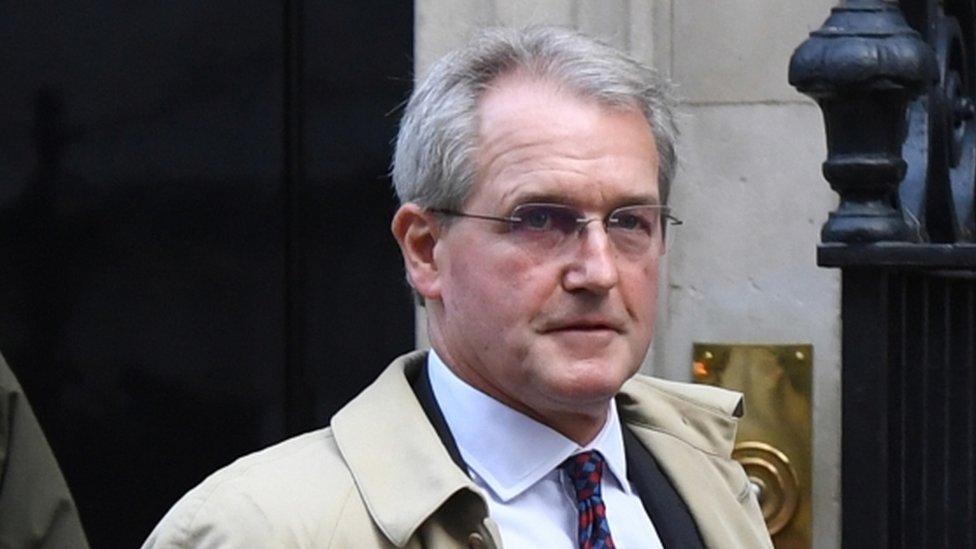Owen Paterson: Conservative MP resigns after report found he broke parliamentary rules
- Published
- comments

The Conservative politician Owen Paterson has resigned after it was found he broke parliamentary rules
Members of Parliaments (or MPs) are chosen by the public to decide on laws and rules for the country, but who makes the rules about them?
This question has come about because of Conservative politician Owen Paterson, who has been at the centre of a big row this week.
Mr Paterson was facing a 30-day ban from the House of Commons after a report found he broke parliamentary rules. However, Conservative politicians then voted to change those rules, which meant his ban would be delayed and he could carry on in his job as normal.
The decision angered a lot of people who said that the government was trying to change the rules just so Mr Paterson didn't face any punishment.
This pressure led the government to change their mind, but soon after Mr Paterson decided to quit his job, saying he wanted a life "outside the cruel world of politics".
This has left everyone wondering, should MPs be allowed to change the rules that govern themselves?
Owen Paterson was in the House of Commons on Wednesday as MPs decided whether he should face a ban
Who is Owen Paterson?
Owen Paterson was a Conservative politician who represented the constituency - or area - of North Shropshire.
He had been been an MP for 24 years after first being elected in 1997.
An MP - which stands for Member of Parliament - is a person elected by all those who live in a particular area (called a constituency) to represent them in the House of Commons. MPs can suggest and vote for new laws as well as raise issues that matter the people that live in their area.
What rules did he break?
For the past few years while he was an MP, Owen Paterson was receiving ÂŁ100,000 a year to be a paid consultant - or an advisor - to two different companies. That's allowed under parliamentary rules.
But last week an official report, which had spent two years looking closely at all of Mr Paterson's actions, was published.
The report said that he had broken the rules many times by using his position as an MP to lobby other ministers and officials to help benefit these two companies. This isn't allowed.
Lobbying is when a person or a group tries to persuade someone in Parliament to support a particular policy or campaign.
The report recommended that as a punishment for breaking the rules, Mr Paterson should be banned from the House of Commons for 30 days.
But Mr Paterson didn't agree with the findings of the report. He said that he had been found guilty "without being spoken to" and that "no proper investigation was undertaken".
When MPs meet together, they do it here in the Houses of Parliament in London, in a place called the House of Commons
What did Parliament do?
On Wednesday, Parliament voted to changing the system for how MPs are investigated.
The vote passed as the Conservative government asked their MPs to vote in favour of changing the rules.
This meant two things - a whole new system would have to be created, and however long that took, Mr Paterson would avoid any punishment for his actions. Mr Paterson welcomed the vote.
The Labour Party's deputy leader Angela Rayner criticised the Prime Minister for wanting to change the rules
What was the response from other politicians?
Many MPs were furious as they felt the government was trying to change the rules to make sure that Mr Paterson didn't face punishment and to make it easier for other politicians who might be investigated in the future.
Sir Keir Starmer, who's the leader of the Labour Party, said that Conservative MPs had voted "to let off one of their own".
Chris Bryant, a Labour MP, felt the change was a danger to democracy.
He said: 'The rule of law means we don't change the rules to protect a friend or attack a foe. That is what Russia does — not Britain."
Democracy - how is the UK run?
What happened next?
Due to the anger from the public and campaign groups, the government decided to drop the plans to change the system that they had wanted and voted for only one day before.
They also decided that everyone should vote again for a second time on whether to ban Mr Paterson.
But, soon after Mr Paterson decided to resign and give up his job as an MP.
In a statement, he said he was "totally innocent" of breaking lobbying rules and said he was "unable to clear my name under the current system".
Labour leader Sir Keir Starmer has asked the prime minister to apologise to the whole country for the "chaotic past 24 hours" and said many people are still angry about what happened and how the government has behaved.
As Mr Paterson has stepped down and there will now be a by-election - a new vote to decide who will now represent the people living in North Shropshire.
So, who makes the rules for the rule makers?
MPs have to follow a 'Code of Conduct' which has been developed over centuries.
However any MP can suggest a change to that code, after which it will then have to be agreed by more than half of Parliament.
So in short, MPs decide the rules for themselves.
What do you think? Is it fair that MPs have a say over the rules that govern them? Let us know in the comments below..
- Published3 December 2019
- Published13 December 2019
- Published24 May
